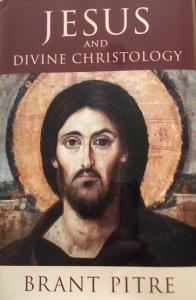The Gospel of John is widely known for Divine Christology. It portrays Jesus as God from the beginning of the letter (John 1:1–3) to its virtual end (John 20:28).To discuss Christology with us, we have once again with us this week Brant Pitre, who recently wrote, Jesus and Divine Christology (Grand Rapids: Eerdmans, 2024).
Dr. Pitre is Distinguished Research Professor of Scripture at the Augustine Institute Graduate School of Theology. He was with us last week to discuss his book in relation to the Synoptic Gospels. This week we will focus on John’s Gospel.

The Interview with Brant Pitre (pt. 2): John’s Gospel
B. J. Oropeza
I notice there are quite a number of passages on John’s Gospel that seem to portray Jesus as divine (See Appendix below). I would think such texts might add further support to your thesis. Any reason why these were not all included in the book?
Brant Pitre
The short answer to that question is that my goal in Jesus and Divine Christology was to offer a compelling rather than comprehensive exploration of the evidence that the historical Jesus claimed to be more than merely human.
Hence, in order to limit the scope (and the length!) of the book, I chose what I thought were clearest episodes from the four first-century Gospels—10 from the Synoptics, and 2 from the Gospel of John—in which Jesus speaks and acts as if he is more than merely human.
Oropeza
I see.
Pitre
In short, my aim was to begin a serious conversation about whether Jesus claimed to be a divine messiah, not to end it.
This topic is a gaping lacuna in contemporary Jesus research—as evidenced by the fact that the 3,600-page Handbook for the Study of Historical Jesus (published by Brill in 2011). It contains no discussion of whether Jesus himself ever made divine claims.
My hope is that future scholars will continue to explore this important topic by further examination of other relevant passages from the Gospels.
Oropeza
How do you go about explaining to other biblical interpreters that the Gospel of John reflects the actual voice of Jesus rather than the Johannine community so that they should take this Gospel seriously (historically speaking) regarding Jesus’s claims that support his deity?
Pitre
Great question—and also difficult to answer briefly. Just a few points.
For one thing, I make no claims about the Gospel of John as a whole. To the contrary, out of the 12 episodes I examine, only two of them—the accusation of blasphemy during Tabernacles (John 8:58–59) and during Hannukah (John 10:30–33). These are both exclusively found in the Fourth Gospel.
Even if interpreters disagree with my evaluation of these two episodes, my hypothesis regarding Jesus’s divine claims still stands on the ten other Synoptic episodes.
Moreover, I go to great lengths to stress that with any given pericope, I am not looking for the exact words of Jesus (ipsissima verba Jesu) but rather for the substance of the words of Jesus (substantia verborum Jesu).
Ironically, this focus on the substance (rather than exact form) of the sayings of Jesus allows us to cast the net somewhat wider than is ordinarily done in Jesus research. Scholars who do not think that the Gospel of John gives us the exact words of Jesus need not worry; I am not look for the ipsissima anything. My goal is to evaluate whether the basic substance of what is attributed to Jesus is contextually plausible, coherent with other evidence, and has consequences in the early Church.
Oropeza
The substance of the words of Jesus is an important distinction to make over the exact words. I hope this deters certain critics.
Pitre
To this end, I wholeheartedly agree with John Meier’s point that “the tyranny of the Synoptic Jesus” in contemporary scholarship should end, and “each case must be judged on its own merits” (See John P. Meier, A Marginal Jew: Rethinking the Historical Jesus; 5 vols. Anchor Yale Bible Reference Library; New Haven: Yale University Press, 1991–2016: 1:45).
In other words, as a matter of principal, historians should treat evidence from the Gospel of John using the same methods with which it analyzes any other ancient evidence about Jesus. Sayings and actions attributed to Jesus must be evaluated on a case-by-case basis, and the arguments both for and against historical surveyed and weighed in the balance. Only in this way can scholarship be consistent and avoid acting on an unproven assumption about the historical value (or lack thereof) of the data in the Fourth Gospel.
Oropeza
I agree.
Pitre
This refusal to a priori rule out John’s Gospel as an historical source is, I think, another distinctive strength of Jesus and Divine Christology, and it will (I hope) be a key feature of the future quest for the historical Jesus.
Oropeza
Thank you for sharing your insights, Brant!
Appendix: On Jesus as Deity in John’s Gospel
Christ is the Word (Logos) who was both with God and is God. He was the agent of all creation (John 1:1–3), and that Word became manifest as the unique or one of kind (μονογενής) son (1:14). Christ is described as the unique God (1:18), and his opponents want to get rid of him because they interpreted his claim as making himself equal with God (John 5:17–18).
Jesus affirms that he and his Father are one, to which he was almost stoned for blasphemy (John 10:28–33). He claims that the one who has seen him has seen the Father (John 14:8–11). He shared in the Father’s glory before the world existed (John 17:5), and Thomas says to him after his resurrection, “My Lord and my God” (John 20:28).
“I am” Sayings of Jesus
Starting in John 6:20, Jesus’s walking on the water includes the claim, “I am” (ἐγώ εἰμι = “It is I). This is the first of several “I am” statements that point to Jesus as divine. The phrase refers to God’s self-identity in Exodus 3:14 (Ἐγώ εἰμι ὁ ὤν LXX/ MT: ehyh ashr ehyh); Isaiah 43:10, 13, 25; 41:4; 46:4; 48:12; and Deut 32:39 (ἐγώ εἰμι LXX /any hu’ MT). These “I am” designations for Jesus as deity include:
- John 8:18, 24, 28, 58, especially his claim in v.58 that before Abraham was, “I am.” This claim prompts those who heard to attempt stoning him for blasphemy.
- John 13:19: when speaking to his disciples what will take place, he says that “you may believe that I am he” (ἐγώ εἰμι).
- John 18:5-8: when those who seek to arrest him ask whether he is “Jesus of Nazareth,” and he replies to them “I am he” (ἐγώ εἰμι), and they fall back.
- Also, regarding his messiahship in John 4:26: The Samaritan woman anticipates the Messiah will come. Jesus responds to her: “I am he” (ἐγώ εἰμι) the one who speaks to you.
Seven More “I am” Sayings of Jesus
In addition to the verses just mentioned, there are seven more “I am” sayings that reveal things about Jesus’s salvific, exclusive, and magnificent character:
- I am the bread of life (John 6:35)—relates to communion with Christ and perhaps Lord’s supper.
- I am the light of the world (John 8:12; 9:5)—relates to guidance, hope, glory, and truth.
- I am the gate (John 10:7, 9)—relates to the way to salvation, protection.
- I am the good shepherd (John 10:10, 14)—Jesus gives his life for the sake of his “sheep.”
- I am the resurrection and the life (11:25)–eternal life and immortality comes through Jesus.
- I am the way, truth and life (14:6) —the way to God the Father, spiritual truth, and eternal life.
- I am the vine (15:5)—related to his followers abiding in Christ.














